Growing LGBT Rights Movement Marks Change in China's Culture

State-run propaganda is one of the most valuable sources of news on the planet; if it is important enough to make it into the official party news, it's important enough for you to figure out why.
This month marked the first time China's secretive LGBT population has tried to use the courts to expand their rights and increase their share of the cultural dialog.
In the past, efforts to use the system have been quietly swept aside, like the introduction of pro-LGBT bills in the National People's Congress in 2006 and 2007.
But this time, not only did the couple get a hearing in court, but it was reported worldwide by the English version of the People's Daily News.
It is unclear what the outcome of the court case will be, but what is clear is a softening of the country's stance on LGBT issues.
As with all propaganda, the real issue is figuring out the 'why' of it all.
Part of it might be trade issues, with large multi-national companies taking harsh stances on America's newest 'bathroom laws' seen as anti-LGBT. Companies like Paypal, a world leader in payment remittances, are showing a harsh reluctance to do business in areas seen as moving socially backwards.
Part of it might be social issues. The Chinese government has already seen the troubles the Russian Federation has had with their hard stance against LGBT issues (especially the worldwide bad press during the 2014 Winter Olympics). It may be politically more expedient to just allow what exists to have its codification in law.
But a lot of it has to be just the fact that we're talking about a huge number of people, and their families, being affected by the law ignoring LGBT issues.
Sexologist Li Yinhe, who also introduced the LGBT bills into the 2006 and 2007 Congress, estimates that about 4 percent of the entire population in China is LGBT. This is well in line with Western estimated percentages, but we're also discussing a nation of 1.357 billion people.
In the end, this is really about China trying to 'normalize' more of its social policies with trading and political partners in the West. Gone are the days of rigid adherence to Chinese traditional culture, but with that the nation must address the realities that exist, and we'll probably see more LGBT issues being discussed by the Chinese government in the future.
Photo Credit: FreshStock / shutterstock.com



